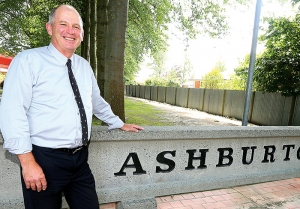Search

 Ashburton College principal Ross Preece says 2018 has been a year of consolidation. Photo Susan SandysAs he wraps up his second year as principal of Ashburton College, Ross Preece says it’s often the things the community doesn’t see that a school uses to measure its success.
Ashburton College principal Ross Preece says 2018 has been a year of consolidation. Photo Susan SandysAs he wraps up his second year as principal of Ashburton College, Ross Preece says it’s often the things the community doesn’t see that a school uses to measure its success.
And for him, receiving a Ministry of Education ERO report that gave the college high pass marks all round, is the best reward any principal could receive.
“It comes around every three years and this time round we were rapt. It’s like getting a medical to a person, it’s our clean bill of health,” Preece said.
Like any good news from a school, a positive ERO often flew under the radar; a bad one would make it into social media, he said.
“And we all know if it’s up there on Facebook, then it must be true. But these guys are the experts and they were very affirming in what they found.”
A major event for the college over the past year had been work on curriculum changes that would impact on Year 9 students next year, Preece said.
The school was moving to an innovative pilot for first-year students that would see them involved in a project-based learning model that sees the integration of some subjects rather than working on the traditional standalone subject model. Up to 12 hours of a student’s week will be spent in the integrated subject model.
About 50 per cent of next year’s Year 9 students will be taking part in the pilot and the option had been really well supported by parents. The change was significant for a school and preparation for next year’s pilot had absorbed a considerable amount of staff time this year, Preece said.
“The idea is to prepare students for what will be an uncertain future in a changing workplace.”
The new school year would also see the start of a new Ako programme that would replace family form time.
Across the school there will be 64 groups of about 16 students, each made up of students from Year 9 to 13. They will meet for one hour each week as well as for a short time on Monday and Friday mornings.
Those groups will create a ‘family’ within the school where students can be taught a range of values. They will also provide opportunities for mentoring and peer support.
Looking ahead to 2019, Preece said he took a fair amount of satisfaction in knowing the year would start with the college all but fully staffed.
“We could be a little short in digital technology. Those teachers are as rare as hens’ teeth because if they’re industry capable they can earn far more money in their industry than they can in teaching,” he said.
Ashburton was fortunate, Preece said, in that it was seen as an attractive place to live and the college was seen as a progressive place to teach.
“Our school’s in great shape and our recent appointments were interested in applying because we’re undertaking curriculum reform. We’re an existing school that’s looking to the future.”
The college will start 2019 with a slightly lower roll than this year, but 2018 had a very large intake of Year 13 students. Student numbers, however, will be higher than ministry predictions, he said.
The college was also experiencing a growing trend where Year 12 students were leaving for employment. That they were able to find work in their own district was a great outcome for the college, the students and the community, Preece said.
Currently the school was at 100 per cent occupancy and that wouldn’t change next year with its predicted roll, he said.
Every year numbers were usually higher, with a number of previously unenrolled students turning up.
There are 263 known Year 9 entrants, up on the ministry’s prediction of 245.
And that meant space would continue to be at a premium and would remain so until the long-awaited classroom rebuild was signed off.
Preece has been working with the school board and the Ministry of Education during the year on a rebuild programme he says will take the college well into the future. How extensive that rebuild will be is as yet unknown, but he’s hopeful it will be extensive and that details will be known early in the new year.
Like many principals around New Zealand, Preece and his staff have to deal with a wide range of student behaviours and, like most, during the year he was forced to defend allegations that the school had a bullying culture after a video of students fighting was filed on social media.
Through social media, issues were often blown out of proportion, but any incidents relating to bullying or anti-social behaviour were taken very seriously by the school board, he said.
The school worked with the New Life Church to provide an on-campus buddy system, 24/7, that saw older teens available during break time to talk with students in a mentoring role.
“They do a fantastic job of supporting students. They’re not trained counsellors but they’re a listening ear.”
The year will also begin with the threat of strike action hanging over schools across the country.
Secondary teachers will join their primary counterparts in strike action over both pay and conditions.
And Preece has long been outspoken about the imbalance between teachers’ pay rates and the huge and varied workload they now carry.
He’s concerned at the dwindling number of teachers who want to move up to the role of principal and said there will shortly be a large exodus at the top with many principals now edging towards retirement.
For younger teachers, the incentives were not there to take on senior roles the same as they were not there for young people to take on what was an incredibly rewarding job as a teacher, he said.
By Sue Newman © The Ashburton Guardian - 26 December 2018

